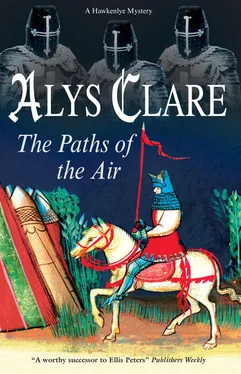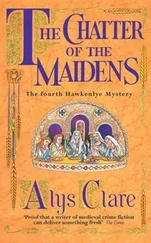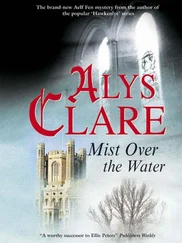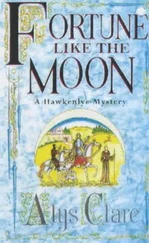Alys Clare - The Paths of the Air
Здесь есть возможность читать онлайн «Alys Clare - The Paths of the Air» весь текст электронной книги совершенно бесплатно (целиком полную версию без сокращений). В некоторых случаях можно слушать аудио, скачать через торрент в формате fb2 и присутствует краткое содержание. Жанр: Исторический детектив, на английском языке. Описание произведения, (предисловие) а так же отзывы посетителей доступны на портале библиотеки ЛибКат.
- Название:The Paths of the Air
- Автор:
- Жанр:
- Год:неизвестен
- ISBN:нет данных
- Рейтинг книги:3 / 5. Голосов: 1
-
Избранное:Добавить в избранное
- Отзывы:
-
Ваша оценка:
- 60
- 1
- 2
- 3
- 4
- 5
The Paths of the Air: краткое содержание, описание и аннотация
Предлагаем к чтению аннотацию, описание, краткое содержание или предисловие (зависит от того, что написал сам автор книги «The Paths of the Air»). Если вы не нашли необходимую информацию о книге — напишите в комментариях, мы постараемся отыскать её.
The Paths of the Air — читать онлайн бесплатно полную книгу (весь текст) целиком
Ниже представлен текст книги, разбитый по страницам. Система сохранения места последней прочитанной страницы, позволяет с удобством читать онлайн бесплатно книгу «The Paths of the Air», без необходимости каждый раз заново искать на чём Вы остановились. Поставьте закладку, и сможете в любой момент перейти на страницу, на которой закончили чтение.
Интервал:
Закладка:
‘There must have been two of them,’ she interrupted calmly.
‘Aye, that was what I was about to say. Who were they? Why did they want poor Jeremiah to die?’
‘It has been occupying me since we knew the poor young man had been so cruelly killed,’ she said. ‘He seems to have lived a short and fairly limited life. What can he possibly have done to earn such retribution?’
‘We’ll have to find out more about him,’ Josse said glumly; he did not relish the prospect. ‘No doubt Thibault will be able to tell us where he was based and, perhaps, what business was taking him to Clerkenwell. We shall have to notify his brethren of his death.’
‘We shall,’ she repeated dully.
He suddenly realized how tired he was. ‘I am going to bed,’ he announced. ‘My head is full of shadows and vague shapes that I feel I ought to recognize yet cannot. I will see more clearly after a good night’s sleep.’
She turned to him and he saw that she looked as weary as he felt. ‘Sleep well, Sir Josse,’ she said. ‘I shall try to do likewise.’
Josse slept deeply for many hours. But then he fell into a vivid and alarming dream in which he and Abbess Helewise rode on a huge white horse along a narrow dusty track, following two shadowy figures. One of them was dressed in the black habit of a Knight Hospitaller; the other wore a flowing brown robe and carried a leather satchel. There was a great sense of urgency, for the figures kept disappearing in mist and sometimes when he caught sight of them there was only one of them. The Abbess was urging him on, and he dug in his heels so that the horse leapt forward with such a violent lurch that he was all but unseated and had to fling his arms around her waist. She felt slim as a reed in his arms and then she was no longer the Abbess but Joanna, naked, twisting round with a smile on her face as she pressed her flesh against his and he began kissing her, caressing her, until Beside him in the lay brothers’ sleeping quarters somebody began to snore.
And Josse, flinging himself over onto his back, clutched the covers around him against the cold of the night and wondered how long it was until morning.
He must have dozed and when he woke again, Brother Augustus was stirring a pot of porridge over the hearth and whistling happily. Josse too felt happy; not as cheerful as Augustus perhaps, but with the quiet satisfaction of knowing his next step. Hurriedly he went to wash as much of himself as the cold morning and the even colder water allowed — which amounted to his hands, face and neck — and he joined Gussie, Brother Saul and old Brother Firmin for breakfast. Then he took his leave of them and hurried to suggest to the Abbess that they ask Thibault about the runaway monk whom they had come so far to find.
The improvement in Thibault’s condition appeared to be continuing. Helewise thought, as she and Josse entered the recess, that his face had lost its deathly pallor and his eyes were brighter.
‘Thibault,’ she began, ‘when you came here before you said you were searching for a runaway monk from your Order; an Englishman. When I asked you to describe him or to tell us his name, you said you did not know these things. I realize,’ she added softly, ‘that you must have had very good reasons for your reticence, but I must confess I did not believe you; for how would it be possible for you to hunt for someone if you didn’t know what he looked like? And surely you must know his name as well as you know your own, for he was of your Order and, I presume, served with you in Outremer.’ She paused, watching Thibault’s face, from which he had carefully removed all expression. ‘I appreciate that those of us in holy orders must obey our superiors,’ she went on, ‘and I do not expect you to reveal information that you have been commanded to keep secret. However, the situation has changed now. A monk has been murdered and you and Brother Otto were badly burned. Will you not share your burden with us, Thibault? Can we not help you carry it for a while?’
Thibault did not answer for some time but stared silently into her eyes. She read yearning in his, as if he longed to confide but knew that he could not. Eventually he said, ‘I appreciate the offer. There is little that I may tell you of why we hunt our runaway. However…’ He paused, as if testing his decision. ‘However, I feel that I may at least tell you something of the man’s life in Outremer.’
She shot a glance at Josse, to discover that he was unsuccessfully suppressing the same excitement that she felt rise up in herself. She said calmly, ‘Very well, Thibault; if you are prepared to do so, then Sir Josse and I are listening.’
Thibault glanced at Brother Otto in the next bed. Otto had his eyes open but Helewise did not think he was aware of them. He looked vacant and she suspected that he was still being dosed with the infirmarer’s sedative and analgesic mixture.
Then Thibault began to speak. ‘The English monk was not a Hospitaller when he arrived in Acre. He came out to Outremer in a company of twenty-five knights and their attendants, all in the service of an English lord who was going to the support of his kinsman in Antioch. The kinsman was a wealthy landowner but his wife had given him only daughters and, hard pressed, he had sent home to England for help in defending his lands. The Englishman fought for his lord at the Battle of Hattin, and in the aftermath of the defeat his master retreated to his kinsman’s home in Antioch to lick his small wounds and recover his strength. According to the Englishman, his master had not enjoyed his experience of fighting and was not keen to repeat it. He had the excuse that his kinsman needed his and his knights’ help in defending his property, which was after all why the lord had come out to Outremer in the first place. Our Englishman, however, felt differently. He made his way from Antioch to Crac des Chevaliers where, in the early autumn of 1187, he was admitted to the Order of the Knights of the Hospital. He was strong and blessed with a fit and healthy body, and worked hard, training his less experienced brethren in the arts of war.’
‘I thought you said he was young?’ Josse asked. ‘How was he able to teach such skills?’
Thibault smiled. ‘Young he might have been — he was eighteen or nineteen when first I met him — but in the year he had spent in Outremer he saw a great deal of action. Moreover, he had received the training that prepares a man for the life of a knight. There was much he had to teach and I observed that once the monks had overcome their disinclination to be drilled by a younger man, they learned to appreciate him. He was modest and he did not permit the role to inflate his sense of self-regard.’ For a moment Thibault stared into the distance. ‘Then,’ he resumed, ‘King Richard arrived and we began the next major onslaught against the enemy.’
‘You were in the fighting?’ Helewise asked.
‘Yes, my lady. I was in the army that took back the great fortress and port of Acre from the infidel and the English monk was of my company. We rode together on the march from Acre to Jaffa and we fought at the Battle of Arsuf, where the Hospitallers formed the rear guard; we and the Templars took it in turns to be the advance guard and that day it was their turn. Despite this, it was our Grand Master himself who led the charge.’ His face glowing, he added quietly, ‘The English monk and I rode side by side.’
Helewise, glancing at Josse, noticed that his face too was alight with excitement. Men, she thought.
‘As we routed the last attacking Saracens, the English monk encountered an old friend. It was his former lord and he had been stricken with dysentery. He was so unwell that he could not sit his horse and the Englishman was ordered to take him back through the lines to where he could be treated. But the lord showed no sign of a speedy recovery and it was decided that he should go back to Acre and thence to his kinsman’s estate in Antioch. Our army was indebted to him; he had supplied a strong force of knights and men-at-arms, most of whom remained to fight with us, and in recognition of this the Hospitallers were ordered to provide an escort to see him safely home. The English monk was selected to care for his lord, and although the task was not to his taste and he would have preferred to remain with the army, he had to do as he was told.’
Читать дальшеИнтервал:
Закладка:
Похожие книги на «The Paths of the Air»
Представляем Вашему вниманию похожие книги на «The Paths of the Air» списком для выбора. Мы отобрали схожую по названию и смыслу литературу в надежде предоставить читателям больше вариантов отыскать новые, интересные, ещё непрочитанные произведения.
Обсуждение, отзывы о книге «The Paths of the Air» и просто собственные мнения читателей. Оставьте ваши комментарии, напишите, что Вы думаете о произведении, его смысле или главных героях. Укажите что конкретно понравилось, а что нет, и почему Вы так считаете.












